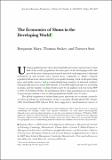The Economics of Slums in the Developing World
Author(s)
Marx, Benjamin; Stoker, Thomas Martin; Suri, Tavneet
DownloadStoker_The Economics.pdf (671.1Kb)
PUBLISHER_POLICY
Publisher Policy
Article is made available in accordance with the publisher's policy and may be subject to US copyright law. Please refer to the publisher's site for terms of use.
Terms of use
Metadata
Show full item recordAbstract
The global expansion of urban slums poses questions for economic research as well as problems for policymakers. We provide evidence that the type of poverty observed in contemporary slums of the developing world is characteristic of that described in the literature on poverty traps. We document how human capital threshold effects, investment inertia, and a "policy trap" may prevent slum dwellers from seizing economic opportunities offered by geographic proximity to the city. We test the assumptions of another theory -- that slums are a just transitory phenomenon characteristic of fastgrowing economies -- by examining the relationship between economic growth, urban growth, and slum growth in the developing world, and whether standards of living of slum dwellers are improving over time, both within slums and across generations. Finally, we discuss why standard policy approaches have often failed to mitigate the expansion of slums in the developing world. Our aim is to inform public debate on the essential issues posed by slums in the developing world.
Date issued
2013-11Department
Massachusetts Institute of Technology. School of Humanities, Arts, and Social Sciences; Sloan School of ManagementJournal
Journal of Economic Perspectives
Publisher
American Economic Association
Citation
Marx, Benjamin, Thomas Stoker, and Tavneet Suri. “The Economics of Slums in the Developing World.” Journal of Economic Perspectives 27, no. 4 (November 2013): 187–210.
Version: Final published version
ISSN
0895-3309